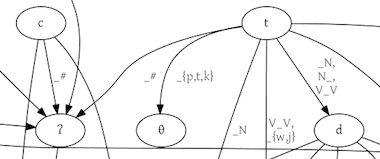Patterns of Allophony
Auteur: William S. Annis
Date MS: 06-20-2019
Date FL: 04-01-2015
Numéro FL: FL-00002B-01
Citation: Annis, William S. 2019. “Patterns of Allophony.”
FL-00002B-01, Fiat Lingua,
droits d'auteur: © 2015 William S. Annis. Ce travail est sous licence
sous une attribution Creative Commons-
Non Commercial-Pas de Dérivés 3.0 Licence non transférée.
http://creativecommons.org/licenses/by-nc-nd/3.0/
Fiat Lingua est produit et maintenu par la Language Creation Society (LCS). Pour plus d'informations
à propos du LCS, visitez http://www.conlang.org/
Patterns of Allophony
William S. Annis
June 20, 2019
This is a small collection of common allophones taken from the PBase database1, presented
as graphs. In making these graphs I have focused on selecting patterns that occur more than
once, or which are part of a larger pattern that occurs more than once. Par exemple, in some
languages /l/ will present as [d] after nasals. In fewer languages both /r/ and /l/ will do this, donc
I include them both. I have tried to leave out one-off exotica, but one or two might have slipped
through if they struck me as especially interesting.
I have omitted certain very common changes. Par exemple, voicing assimilation of any kind
is left out for consonant clusters, and do I not include either nasal assimilation or word-final
devoicing.
I have also left out all patterns of deletion, which are also largely predictable (comme
codas, word-finally, etc.).
Reading the Graphs
Arrows indicate the direction of change. The environment in which the change occurs is indi-
cated by the grey text to the right of the line. Ainsi, in the selection below, note that /t/ becomes [je]
before /p/, /t/, and /k/, but becomes the glottal stop [ʔ] word finally.
The environments are given in fairly standard notation: C is a consonant, V a vowel, N any nasal
consonne, # is a word boundary, and the underline represents the sound itself. Curly braces
enclose a set of phonemes. Ainsi, the notation _# marks a change that occurs at the end of a word,
_{w,j}V marks a change that occurs when the sound is followed by either /w/ or /j/ and then a
voyelle, and #_{J’ai,e} marks a change that happens at the start of a word and followed by either /i/
or /e/.
1(cid:63)(cid:105)(cid:105)(cid:84)(cid:44)(cid:102)(cid:102)(cid:84)(cid:35)(cid:28)(cid:98)(cid:50)(cid:88)(cid:35)(cid:96)(cid:81)(cid:63)(cid:28)(cid:77)(cid:88)(cid:43)(cid:28)(cid:102)(cid:91)(cid:109)(cid:50)(cid:96)(cid:118)
1
_{h, ʔ}tu
_i,
e{h, ʔ}_
_{w,j}{J’ai,tu}
J’ai
������
À
_{k,g,le,w},
{k,g,le,w}_
_N
æ
_#,
_{j,h,ʔ},
_j
aʔ_
_N
{tʃ,z}_,
_w
_{k,X,l,le},
_r{t,d,s}
_jV,
_{m,est},
_C#,
_a
_ʔ{e,o}
_{p,f,m}
_N
{tʃ,ʃ,j}_
{k, w}_{k, w},
_r,
_N,
C_C,
_CC,
_C#
_{l,le},
_CC,
_C#
_{w,j,h},
_{ʒ},
_#
e
V_V
w_, _w,
_t{o,tu}
aʔ_
w_{b,g,m,ŋ,w},
{k,w}_{k,w},
w_C
e
_jV
j
{tʃ,ʃ}_
C_C
{ʃ,ʒ}_
_jV,
_{m,est},
_a,
_C#
{k, w}_{k, w},
_j,
_ʔ{e,o},
_#
ə
ɪ
{ʔ,h}_,
_{ʔ,h}
ɨ
_{h,m,w},
_{ʔ,w},
{p,f,m,w}_{p,f,m,w},
_{p,f,m}
_{b,m,le}
tu
_r,
_N,
C_C,
_C#,
_{w, kʷ}
ʊ
_V
_#
_t{o,tu}
_t{o,tu}
_V
_Xa
ɑ
o
_V
_N
_CC,
_C#
_{t,s,est},
_CC,
_#
w
ɔ
p
_N,
N_,
V_V
_{p,t,k}
_N
V_V
f
b
V_V
_{p,t,k}
_#
_{o,tu}
_N,
_#
β
m
v
ʔm
ɸ
w
_{o,tu},
V_V
_{tu,o,ɔ}
_{tu,o,ɔ},
V_V,
_#
��������������������
k
V_V,
_{p,t,k}
_{J’ai,e},
{J’ai,e}_
{À,o}_,
{À,ɔ}_{À,ɔ},
_{À,ɔ}
X
q
V_V
V_V
_#
_N,
N_,
V_V
_#
_{tu,o,ɔ},
{o,tu}_V
_#
ɢ
h
ɴ
_#
c
t
ts
{J’ai,e}_V
_#
_{J’ai,e},
{J’ai,e}_
g
_#
ʔ
_#
_{p,t,k}
_N,
N_,
V_V
je
_N
V_V,
_{w,j}
d
V_V,
N_,
_N
dz
_{J’ai,j}
_{J’ai,j}
_{J’ai,e}
V_V
{J’ai,e}_V
tʃ
cç
z
_{tu,o,ɔ},
{o,tu}_V,
#_
ŋ
_#
_{J’ai,e}
V_V,
_{p,t,k},
_{d,z,est,l,le,j}
_#
_C,
_#
ɟ
_#
s
ɣ
{J’ai,e}_V
a_V
est
_#,
#_,
_{J’ai,tu}
j
_N,
_#
ɾ
V_V
_{p,t,k}
_#
_t,
_{J’ai,tu}
_{J’ai,j}
_{J’ai,e}
V_V
_{J’ai,e}
_t,
_C
_N,
V_V,
_{b,d,g}
ð
ʔn
_t
_{d,dz,g}
dʒ
ʃ
_t
V_V
V_V
_t
_{J’ai,e}
s
ʒ
f
_{o,tu}
_{o,tu}
N_,
_{s,z,ʃ,ʒ}
ɸ
_{t,est}
h
����������
ð
N_
_{s,z,ʃ,ʒ}
v
pf
d
N_,
#_{o,tu}
_{t,est}
_{p,t,k,ʔ},
_{J’ai,tu},
{J’ai,tu}_
_s,
_{k,t,p},
N_
_{o,tu}
_n
p
je
est
s
m_,
_{s,z,ʃ,ʒ}
β
V_a
_m
z
ɣ
V_V
_{s,z,ʃ,ʒ}
_{s,z}
_{J’ai,e},
_k{J’ai,j},
_{tʃ,dʒ,ʃ,ʒ}
N_,
{p,t,k,w,ɾ}
ɦ
t
_w
ʃ
ts
_s
ʔ
_w
N_
V_V
_{J’ai,e},
i_V
N_
V_V,
_{o,tu}
_n,
n_
_{J’ai,e},
_{tʃ,dʒ,ʃ,ʒ}
_{tu,o,ɔ}
_{J’ai,e,j}
N_,
_{s,z,ʃ,ʒ}
b
w
m
V_a
ʒ
g
_{J’ai,e,e}
_ŋ
X
tʃ
j
_{s,z,ʃ,ʒ}
k
ŋ
_{w,j}V
#_u
���������
m
_i
�g
w
l
_{tu,o,À},
_{w,j}
le
#_{J’ai,e,}
_{J’ai,tu}
_V[+nasal],
_n
_i
V_V
_{w,j}V
_{c,ɟ,s,j},
_{J’ai,e}
n_
N_,
#_{J’ai,e}
_{o,ɔ,tu}
V_{o,tu}
{t,f,s}_
V_V
_#,
_{J’ai,e}
p_
m_
V_V
b_
_w
_{t,d,s,ʃ,z,ʒ,l,est}
V_V
_{t,ts,s,le},#_{J’ai,e,À},
_n
N_,
w̃
�b
_{c,ɟ,s,j}
b
{b,d,v}_,
N_
j
k
ɣʷ
β
{J’ai,tu,À}_{J’ai,tu,À},
_#
X
p
v
_C,
_{w,j}
ɣ
_{k,kʷ}
ɾ
N_,
est
_V[+nasal]
#_{ɨ,ə,À},
_N
_{w,j}
s
g
ʃ
N_,
_N
dʒ
n_
{J’ai,tu,À}_{J’ai,tu,À},
_#,
V_i
z
ʔ
_{p,t,k,s,h,ɾ,w}
n_
_{w,j}V
h
d
ⁿd

